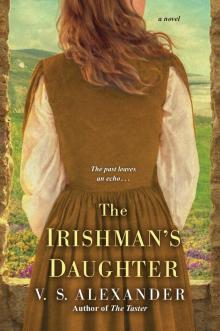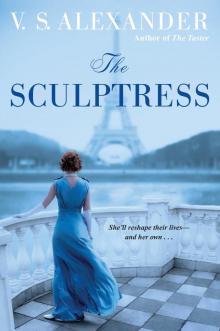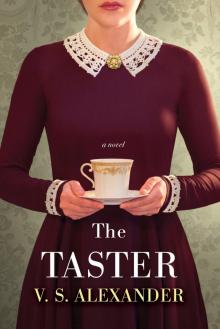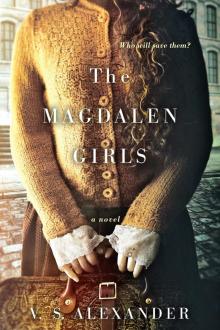- Home
- V. S. Alexander
The Irishman's Daughter Page 5
The Irishman's Daughter Read online
Page 5
Rory tethered the horses to iron spikes driven into the quay rock. Brian dismounted and fed the hungry animals from their dwindling supply of oats.
Rory placed his hand between the brim of his cap and his eyes. His gaze was soon directed at the steamer anchored in the bay. “It’s the Tristan. I’ll see if I can find the Captain.”
Briana got off her horse and stood by it. Several English sailors dressed in white breeches, dark jackets, and blue caps stared as they walked by. They whispered what she suspected might be salacious words judging from their sneering looks. Would they have spoken such words in front of a lady in their home country? She focused on the Reek, while her face flushed from the unwanted attention.
Rory arrived a few minutes later with a satisfied look on his face. “A sailor from the Tristan told me the Captain and most of the crew are at a pub called The Black Ram. We can get water and food there for the horses.”
They mounted the animals and retraced their route, past the mansion, to the village center.
“I’m sure it’s not hard to find,” Rory said as they descended the hill by the monument. Before crossing the bridge again, they found a lane that ran east along the Carrowbeg. The sign of The Black Ram, a devilish animal with curled horns painted over a white background, swayed in the wind.
A group of sailors congregated on the benches outside the pub’s door. They talked, laughed, and smoked their pipes while tipping their cups.
Swells of laughter boomed from the establishment. The door stood open, and the intermingled smell of tobacco and stale ale struck her as they traveled past. Other unsavory odors filled the air. Several sailors emerged from the shadows at the back of the building, buttoning up their breeches as they walked. She held her breath for a moment, hoping that Rory would let her go with him.
“Wait here with the horses,” Rory told her.
“No. I’m coming inside. Da can stay here if he wants.”
“Not me,” Brian said. “I could use a drink.”
Rory secured the animals to a tree near the river. “All right, but stay close. We don’t want any trouble with the English Navy.”
Two windows were set into the pub walls on either side of the door. Through the wavy glass, Briana saw a room full of sailors conversing at tables and leaning on a long wooden bar against the back wall. She walked into The Black Ram between Rory and her father, Rory leading the way. The sailors hushed when she entered. The silence lingered for more time than she would have liked, as two dozen pairs of eyes ogled her; but soon the men resumed their chatter.
A hazy cloud of pipe smoke obscured the room. Rory craned his neck looking for the Captain. Briana supposed the officer might be dressed differently from the others, but no man stood out from the crowd. As they weaved around the tables, Rory headed toward a chair draped by a long jacket with split tails. A tall man with wavy black hair dressed in white breeches and a cuffed white shirt leaned against the bar. He was older than the other men, more seasoned, with a ruddy, weathered face. Briana believed he might be the Captain. Apparently, so did Rory. He approached the man, who gave him a wary look.
She moved behind Rory to hear the conversation. Her father hitched his thumb toward the bar. “I’ll leave this to a younger man,” he shouted at her.
“Are you the Captain of the Tristan?” Rory asked.
The man put down his cup, turned, and thrust his elbows back on the bar. “Aye, sir. Why do you ask?”
“I’ve come for a favor,” Rory said.
The Captain studied Rory, sizing him up for what the request might be. Rory leaned close to the man.
The laughter and songs echoing through the pub blocked Briana from hearing more. A woman in a black dress and long, dark hair stood behind the counter and poured her father a mug of poteen. Brian paid the woman and leaned over, intent on talking to her. She smiled and casually drifted away from him, more concerned about serving her large contingent of sailors than chatting with an older man.
Briana caught her arm as she walked from behind the bar. “Do you have a pail for water?” She was eager to get out of the pub, away from the smoke and the raucous laughter.
The woman scoffed and pushed Briana’s hand away. “Fool, do I look like I have time for that with all these Englishmen thrashing about?” She cocked her head. “Don’t get me wrong. Business is business.”
“We’ve come from Lear House at Carrowteige. Our horses need water.”
The woman’s eyes brightened, and she pulled a battered metal pail from under the counter. “Oh, I have a soft spot in my heart for animals. I can’t keep track of all the stray dogs and cats. I feed them when I can. There’s plenty of water in the Carrowbeg with the rain we’ve been having. Help yourself to the pail—just bring it back.” After handing it to Briana, she went about her business of flirting with the sailors and taking orders.
Rory was involved in his conversation with the Captain, who seemed to have loosened up enough that he was laughing now. Briana threaded her way past the tables, out the door, and into the sunshine. It felt good to be out of the close, smoky bar and into the fresh air. She walked past the men and made her way to the river. Several women were washing clothes near stone steps that led down to the water. Briana slipped past them with a “hello” and dipped the pail into the brown water. The chilly current washed over her hands.
She gathered the pail and returned to the animals. They drank greedily, lapping at the cool liquid with their pink tongues. A shadow fell across her horse.
“A real Irish lass,” a man said in English. The shadow weaved behind her. “I’ve been watching your horses so no bastard takes them.”
Briana turned her head to see a red-faced sailor lolling behind her. His eyes had sunk into his head from too much liquor. She wanted to ignore him, but he staggered toward her, his face bloated from the drink. He locked his arms around her waist, squeezed, and fitted his pelvis against hers.
Still holding the pail, she said in English, “I appreciate you looking after our animals, but get away from me or you’ll be lucky to have children.”
“Ah,” the sailor cooed in her ear. “I hear Irish country girls are the best.”
Briana steeled her body, twisted, and threw the remaining water in the sailor’s face. He yelped and sputtered backward. The shock seemed to temporarily sober him up. His cheeks flushed with rage. Before he had a chance to speak, Briana kicked him in the groin and sent him sprawling to the ground. She stared at him defiantly.
He rose on his elbows, recovered enough to spit out, “You little bitch! I’ll have you in the mud!”
But before the sailor could rise up, the Captain’s black boot came down upon his chest. “Enough, you idiot! Get back to the ship and clean yourself up, or you’ll be in the brig.” The sailor, his lips quivering, gawked at his Captain. The officer lifted his right leg and stamped it close to the sailor’s face. Rory, bristling with his own rage, rushed to the officer’s side. Briana knew he was aching to thrash the sailor.
Moaning, the man tried to lift himself from the ground but fell back. The Captain grabbed the sailor by the left arm, lifted him, and shoved him toward the ship. The other sailors, some whistling and catcalling at their mate, watched as he staggered down the lane.
The officer approached Briana and extended his hand. “I’m Captain James. I apologize for my man. I make no excuses for his behavior, except that he may have had too much of your fine Irish whiskey. How can I make up for his poor manners?”
She shook his hand and, without hesitation, said, “You can give us food.”
Captain James nodded. “The least I can do, miss. If you give me an hour, I’ll gather some. Let me get my coat.” He turned and walked inside.
“Are you all right?” Rory asked after the officer left. “The Captain and I were coming out the door when we saw the water fly. By God, you didn’t need my help.”
“I had to take matters into my own hands,” Briana said. Her father had taught her to defend herself becaus
e he knew how much she loved to roam the countryside. Brian, a slight man who fought like a hellion, had given her the means to save herself from a sailor intent on doing harm. With no mother to guide his daughter, Brian had done his best.
Rory kissed her hand and held it to his chest. “I’d always like to be around to protect you.” His words were sincere, and she realized that life outside Lear House had become perilous. Fortunately, fate had handed her a sailor who was an easy mark, drunk as he was. The thought of a sober man attempting the same chilled her.
The proprietress stood smiling in the doorway. Her father peered over her shoulder, his face cheerful with a tipsy smile. Briana returned the pail to the woman, thanked her, and grabbed her father by the arm. “Come on, Da. You’ve had enough.”
“You’ve got a hell of a daughter, there,” the woman said to her father.
Her father had consumed more than his share of poteen and seemed giddy with delight. “I haven’t had such a grand time in ages.” He kissed the woman on the cheek. “We should come to Westport more often.” The proprietress scoffed and swiped her fingers against her cheek, dispersing the kiss. She disappeared into the smoky room.
The Captain returned with his coat. Its brass buttons shone against the blue wool, gleaming like golden spheres in the sun. “If you wouldn’t mind me using one of your horses . . .”
“I’ll accompany you,” Rory said. They mounted the animals and rode off toward the Tristan.
Briana and her father sat near the river, enjoying the warm sun. None of the sailors bothered them, although their voices became increasingly loud as the drink flowed. After an hour, another sailor returned with Rory. He dismounted from the pony and said, “With the Captain’s compliments . . . and his humble apology.” He handed a large leather pouch to Briana and then walked back toward the ship.
Rory and Brian waited with eager smiles for a glimpse of the contents. Her father whistled when she opened the pouch. The Captain had given them dried meats, biscuits, several cakes—all neatly wrapped—and a bottle of French brandy.
“We’ve been handed the pot o’gold,” her father said, eyeing the brandy.
Rory took a look as well, salivating over the biscuits and cakes. “Yes, but I’m not happy how it happened.”
“Hands off.” She slapped their fingers away and closed the pouch.
This time it was Rory’s turn to whistle as he turned his gaze toward the road that led to the quay. “Would you look at that.”
A squad of dragoons, attired in their red vests and long breeches, marched over the bridge alongside wagons loaded with bags of oats and other foodstuffs. They were headed toward the port. The soldiers, muskets slung against their shoulders, were positioned on either side of the cargo. The drivers appeared to be Irishmen who had been paid to haul the goods. They looked neither left nor right at the silent men and women who stared at them as they passed.
“I can’t believe my eyes,” Briana said. “The very food we grow is being taken to the port—leaving Ireland.”
Rory turned, his eyes dimming. “I’m afraid so. That’s why the Tristan is here—to make sure that this food gets out safely . . . to feed the English.”
The dragoons couldn’t be fought, nor could the laws regarding exports be changed. Tenants needed to make money to pay their rents. They could do that only by selling the food they grew.
“I’ve had enough of this spectacle,” Rory said. “We’ll eat before we get to the Kilbanes’. I don’t want to deprive them of their food.” He sneered at the wagons and the dragoons trudging away from them. They mounted their horses and trotted north on the road leading out of Westport.
The afternoon shadows had deepened, and Briana noticed something had changed since they had come into Westport that morning. People—fifty of them at least, men, women, and children—lined the road out of town. They looked like sad ghosts in their dirty clothes. Briana rode up next to Rory, unsettled by the sight.
“They’re going to Westport, perhaps Castlebar, looking for food and work,” Rory told her.
They were sad ghosts. Families clad in worn clothes huddled along the side of the road. Nearly everyone was barefoot, many clutching a satchel of belongings. The ghostly walk, the sunken faces and eyes, the pitiful lethargy, reminded Briana of the family she had seen living in the sceilp.
The starving people watched them from the road with eager eyes searching for food, seeking hope in a world of misery. Briana looked at the pouch of food given to them by the Captain and wondered how long a family could exist on the treasure they carried. A week? Perhaps longer if the food was properly rationed. As the town and Croagh Patrick faded in the distance, and the northern hills came into view, the stream of ragged people thinned. They had, like animals, disappeared in the brush.
As she rode, she saw only the vacant stares of the starving. Rory was right—she couldn’t save them all, but perhaps she could help the man who had stopped them at the river. If she had her way, he and his family would enjoy some of the prized food they’d received from Captain James. But there were others to think of as well—the tenants, Rory’s brother, and his family. Hard choices would have to be made with so little food available.
Briana took one last look back. Westport had disappeared under the swell of hills, but Croagh Patrick’s peak still towered on the southern horizon.
How could the government let this happen? How many would die? She shivered, although the sun warmed her shoulders. Fear had spread its icy fingers over her. This wasn’t a dream. The dragoons were escorting food out of Ireland. How long would it be before this disaster touched her and her family?
Her mind swirled with thoughts of how to save them, but there were no easy answers. How could she fight an enemy she couldn’t see who robbed them of their strength? She straightened in the saddle and vowed to carry on, to protect her father and Lear House as best she could. Her father’s horse trotted ahead. She fought back tears. Brian’s stooped back already showed the physical and emotional toll the blight had taken, and this was only the beginning.
CHAPTER 4
They stopped near a stream that ran down from the burnished slopes of the Nephin Beg. “So, the Tristan carried no Indian corn?” Briana asked as she looked at the pouch the Captain had given them.
“Not a kernel,” Rory answered. “No relief to be had for the people. My brother was right about the ship but wrong about the corn. The Captain said more corn would be delivered, but it would go directly to the storehouses to be distributed.”
Brian shook his head. “We made a trip for meal the government is supposed to be supplying to the starving, yet there was none.”
“No negotiation as the landlord’s agent needed,” Rory said. “Save it for another time.”
The conversation didn’t cheer Briana, but there was nothing she could do about a failed journey. At least they had returned with some food. She led her horse to the rushing current, clutching at her back, which was stiff from the long ride. The late afternoon sun sparkled on the dewy bank as cold drops of water splashed against her ankles.
Brian stretched on tiptoe, his hands high in the air, as fatigued from the trip as she.
Deep shadows cut across the grassy mounds, bringing back pleasant memories of a childhood spent playing on the Lear House lawn. She had always loved the spring and the nascent promise of summer. Summer. The most beautiful season in Ireland. Her mother had died in winter during the deep, dark days with no light. Winter was her least favorite time of year.
The horses munched on the oats Rory threw on the tussocks. Briana rested in the shade of a sycamore. Light shimmered in variegated patterns across her dress as the leaves shifted in the breeze.
The bleakness of the situation blunted their conversation. They said little as they ate the remainder of the provisions they had packed for the journey. Rory and her father sampled a few bites from Captain James’s gift. Briana tried to stop them but failed.
“That’s enough,” she said, and took back
the pouch. Part of the treasure, some of the cakes and the dried meat, should be saved for the starving family. The pouch was lighter, though, and she peered inside it. “Where’s the brandy?” She looked at her father.
“When will the corn arrive?” Brian ignored her question and wiped his mouth with his sleeve.
“The Captain said later this month. We may have to make another trip to Westport. The journey would be faster if we traveled by ship by way of Belmullet.” He rubbed his hands, a sign of his anxiety that Briana knew all too well. “Even the Captain admitted the situation is not good. The Indian corn is coming into Cork. It has to be processed before it can be sent out to distribution centers. At least, that’s the way he explained it to me.”
“Westport, every harbor, will be crawling with soldiers,” Brian said. “They’ll have to protect the corn from the starving when it comes, even as they take away what we grow.”
“I’ll ask one more time—where’s the brandy?” Briana closed the pouch and drew it close to her. “At this rate, there’ll be little left for anyone. Did the Captain say he would help us get the meal?”
Rory pulled the brandy from behind his back, lifted the bottle in a tease to Briana and popped the cork. “He was a nice-enough Englishman, but he didn’t make promises.” The sun painted his body with a gold light. “Sometimes promises can’t be kept.” He turned to Brian. “If she hadn’t kicked that sailor in the privates, we wouldn’t have this. Now we know how to get food.”
“Take it easy on the brandy,” Brian said, and took the bottle away from Rory. “That’s expensive stuff.” Her father took a swig, smacked his lips, and sighed. “Excellent. Let’s keep this bottle. No more taking nips from Master Blakely’s lot.”
Briana snatched the bottle from her father. “We’ve other things to think on besides liquor.” She knew that her father was trying to make the best of uncertain times, but it bothered her to see him enjoying expensive brandy a little too much.

 The Irishman's Daughter
The Irishman's Daughter The Sculptress
The Sculptress The Taster
The Taster Her Hidden Life
Her Hidden Life The Magdalen Girls
The Magdalen Girls